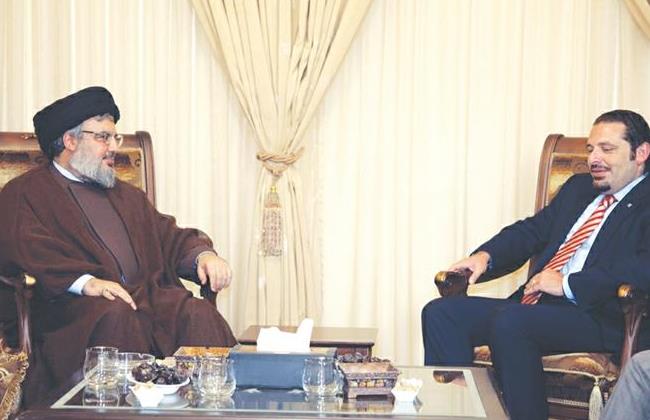Much weight on Future-Hezbollah talks
Antoine Ghattas Saab/The Daily Star/Nov. 26, 2014 |
Observers are putting much weight on the outcome of possible dialogue between the Future Movement and Hezbollah, especially after both sides appear to be aware of how important their communication will be in the current political context. Sources with knowledge about the progress of the dialogue, still at the beginning stages, said at the moment representatives from both parties are meeting to set the agenda of the future dialogue.
The first level of dialogue won’t involve top officials, the sources said. But representatives will be given authorization from party leaders, which the source said was an important step.
Also, the manner by which agenda topics are raised – whether with openness and understanding or based on previous convictions – would indicate whether talks will be successful or not, the sources added.
Figures from the Future Movement recently met with former premier Saad Hariri in Riyadh, where they discussed the dialogue agenda, while Hezbollah is preparing its own proposals, the sources said.
Hariri is expected to announce his official stance on the dialogue on Kalam an-Nas, a political television show, this Thursday.
He is currently holding intensive sessions with Future officials and senior aides in preparation for the announcement. He met with Future bloc head Fouad Siniora, Interior Minister Nouhad Machnouk, Justice Minister Ashraf Rifi and Nader Hariri, director of Hariri’s office.
Sources did not rule out the possibility that the agenda would not stray from the one recommended by Hariri during an iftar banquet at BIEL earlier this year, in which he said talks should touch on the presidential election, a new electoral law and parliamentary elections.
Knowing that it’s near impossible to negotiate with Hezbollah about its weapons arsenal and presence in Syria, as these issues relate to its regional ally and patron Iran, the source believes the dialogue will center on the presidential vacuum.
The file became negotiable after Hezbollah leader Sayyed Hasan Nasrallah agreed to enter a dialogue with Future, a decision made in light of new political calculations after Tehran and the West failed to reach a final agreement over Iran’s nuclear program, the sources said.
The dialogue is highly anticipated, the source said, because it is expected to bring about positive changes at the political, security and economic levels.
Concerning the agenda from Future’s perspective, party sources said agreement over agenda items with Hezbollah would indicate whether talks are to proceed. What is clear is that the now six-month and counting presidential vacuum and the tough security situation in the context of precarious regional developments require engaging deeply with Hezbollah.
“We don’t want the dialogue with Hezbollah to only be talk,” one source said. “We already hold talks with the party’s ministers and lawmakers. What we really expect from the dialogue is to produce practical decisions.”
The meeting in Ain al-Tineh earlier this month between Siniora and Nader Hariri on one side and Speaker Nabih Berri on the other resulted in an agreement about the importance of determining an agenda for the dialogue.
Berri had confirmed during the meeting that he would take care of preparing the atmosphere for talks to take place, which has proved to be no easy task.
Former Prime Minister Hariri, for instance, first had to contain Saudi Arabia’s escalation against Hezbollah, and had asked his party’s leaders to not discuss the Saudi demand at the United Nations Security Council to impose sanctions on Hezbollah and other “terrorist” organizations, the sources told The Daily Star.
In the end, Hariri’s political maneuvering was well received, and was considered a positive sign as preparations to hold the dialogue continued.
Berri will mediate the dialogue and move talks along according to a detailed schedule prepared in advance, the sources said. They also indicated that the dialogue’s outcome would not require major compromises to be made, but consist of a list of items aimed at putting the state institutions back on track, starting with a consensus president.
In addition, a visit made by a Hezbollah delegation to Rabieh, the headquarters of the Free Patriotic Movement, where it announced its sponsorship of MP Michel Aoun for president, has also threatened to undermine dialogue. One of the goals of the dialogue is to first agree on a president who can later head a national dialogue in Baabda.
Deep trust issues remain between the Future Movement and Hezbollah, yet working on creating an atmosphere amenable to holding talks is crucial. If talks fail, Hariri’s supporters will be affected, and the Future Movement leader keeps this fact close in mind.




















